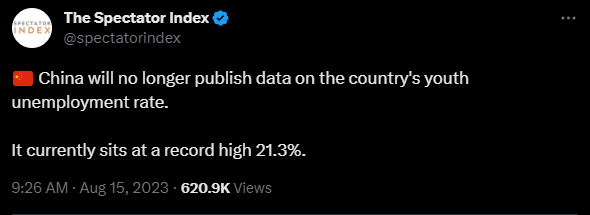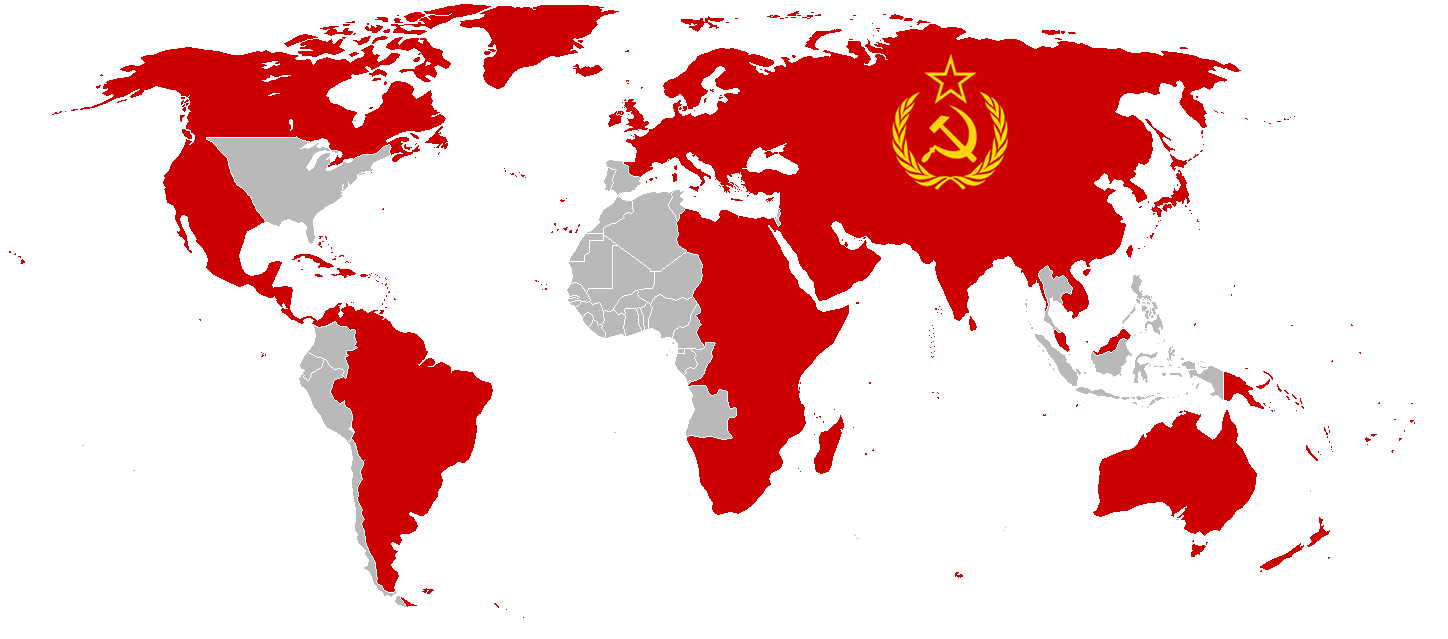To clarify, I don’t believe in the surface level propaganda thrown in China’s way about “1984 dystopian society,” “Mao killed 60 million people,” “Xinjiang concentration camps” or things like that.
I’m curious about a few negative factors of China that have become widespread knowledge over the past decade or so by even the politically literate audience, and I want to learn how accurate these things are, how prevalent they are in today’s society in China, and how much it would impact the day to day life of someone living in China.
-
Quality control, I have read stories about Chinese factories producing guns, steel, industrial goods, consumer goods, food products, far below acceptable or safe standards, leading to construction/infrastructure failure and severe health complications. There are also claims that smaller restaurants in China today still sometimes use very low quality ingredients that can result in serious health issues. How much of an issue is this?
-
Population issue. The Chinese population trend is going in a unfavorable direction right now, and there are reports of young people not wanting to have children because of cultural and cost reasons. How much of an issue is this, and will China end up like Korea and Japan in another decade or two?
-
Unemployment, it is a fact right now that Chinese people have a 20% unemployment issue due to an abundance of university graduates without sufficient jobs to match this supply. And this has caused internal competition to swell to unreasonable standards leading some people to straight up give up on their careers and become full time neets. Are there any positive trends or actions to resolve this issue?
-
Education. The education system sounds terrifying in China right now, children as young as elementary schoolers having to sleep only 6 hours a night to finish their homework from school and tutoring services. I have also read that after the government banned tutoring of core classroom subjects, illegal tutoring services have become a thing. I would laugh at how this would be the most asian issue ever if I wasn’t so horrified by the situation. Is there any government effort to resolve this right now?
-
Nepotism. From what I have heard and read, using connections to obtain positions and resources in China is still very common. How bad is this, and are there any reforms or policies tackling it?
-
Mannerisms and emotional intelligence of the average person. There are frequent complaints about Chinese people being horrible tourists, being extremely rude, having the emotional maturity of a donut until at least the age of 30, and also taking advantage of anything free to disgusting levels (I have personally seen old Chinese ladies take out a container and fill it with ketchup from a restaurant where the condiments are self served). I understand the reasoning behind this, China in it’s current iteration is a relatively new country, and the education received by different generations varies massively in quality, with only really Gen Z on average obtaining a level of education that is on par with western populations. I just want to ask how bad this is in day to day life, and if it is tolerable.
Thanks for reading my somewhat long post, I’d appreciate any response, you don’t have to respond to all of my points, any point would be fine. I want to have a positive impression of China but these points are really bugging me right now.
Thanks for pinging me @GrainEater@lemmygrad.ml (sounds like what people on Zhihu, the Chinese Quora, would say).
Points 1/5/6 about quality control, nepotism and mannerisms are about the same thing, that is whether you can generalize a few bad eggs to the entire group. My personal experience isn’t going to be the same as someone next door, let alone someone from a different province, so the right place to look for answers is in statistics. I’ve heard the things you mentioned in these three points at least a decade ago, things have definitely become better is what I can tell you.
Point 2 about population, I’m part of the “young people who do not
want tohave kids”, I strikeout the want to because I don’t think people who don’t want kids really mean it. I’m not a population expert so I’ll pass on trying to estimate population numbers. Personally I think the cost of raising kids that some people mention mostly refers to the quality of education (which I’ll mention below in point 4), and cost of living.Point 3 about unemployment. “20% unemployment” is bogus talking point cooked up by Chinese liberal economists, here’s the actual statistic they conjured this “data” from: http://www.stats.gov.cn/english/PressRelease/202307/t20230715_1941276.html
Specifically, the surveyed unemployment rates of population aged from 16 to 24 and from 25 to 59 were 21.3 percent and 4.1 percent respectively
To anyone who can read, 21.3% unemployment refers to a narrow range of people from ages 16 to 24, but some liberals intentionally generalized it into the entire working population. Some economists went further and found a way to turn this 21.3% into around 50% unemployment.
Point 4 about education. Due to the large population of students and not enough resources to go around, there is definitely fierce competition among parents who want a better future for their kids. Note that I mention parents and not students, because I don’t think most kids have the mental capacity or experience to understand what a better future is. Some parents go the extra mile and pay for tutoring outside of school to try to improve their kids’ grades, this is understandable. But if all parents think like this, it’s just going to come down to who is rich enough to employ better tutors on the market. Families who are not as well-off won’t be able to compete if they also try to find tutors for their children. This is one of the reasons why tutoring for core subjects is banned, because the quality of education should not depend on how much capital a family can muster. There are also policies to reduce the amount of homework from school, can’t comment on the effects as I don’t have kids.
You don’t need to have a positive impression of China, you can come here personally to see for yourself if you haven’t, then form your own conclusions.
Um, some people really don’t want kids, not because of economics, but because they don’t want them at all.
About points 1 and 5, are there any of the aforementioned statistics that could paint a quantitative response regarding the issue? I understand China is working to address these issues, I am interested in how effective these measures are and how much it has improved.
I understand the unemployment issue better now from some other comments and gave my responses there.
About point 2 and 4, correct me if I’m misinterpreting your response, but so far these issues are connected because although Chinese families might want kids, the educational costs attached make this impossible for some?
I agree that banning the tutoring classes was a correct choice, however the emergence of illegal tutoring services and their popularity does paint a rather frustrating truth about the difficulty to resolve this issue, that is the inherent competitiveness of Chinese culture amongst the parents of this generation makes this issue very complicated, which is corroborated by your explanation of the issue.
And if this is the case, wouldn’t this be a deadlock of parents not being able to afford raising children because of the educational costs, and the educational costs being so high because of the academic pressure parents put on their children? That sounds like a clusterfuck, does the CPC have any ideas on how to resolve this right now?
There are certainly statistics about overall quality of products from the manufacturing industry, but I think it’s too broad to be very useful. For example, from this year’s statistical communique (http://www.stats.gov.cn/english/PressRelease/202302/t20230227_1918979.html):
The qualification rate of manufactured products[64] reached 93.29 percent.
[64] The qualification rate of manufactured products is the ratio of the samples that have passed the sampling quality test, the process of which follows certain methods, procedure and standard, to the total amount of the sampled products. The survey samples cover 29 sectors of the manufacturing industry.
For more specific statistics you’d need a more specific question. About nepotism, the campaign against corruption has some statistics but I don’t think there’s a way to quantitatively reflect on the issue of nepotism.
On educational costs, this is a manufactured need as public education from kindergarten to grade 12 is practically free in China, and university costs are almost practically free. Now private education is where things can become very expensive as you can imagine, this includes private schools and private tutoring.
Some parents think that expensive private schools offer better quality of education, or think that they are better alternatives to some low-par public schools, but I think they just cost more. Private tutoring isn’t just about core subjects, some parents may also want to enroll their kids into arts/tech/sports/etc. training classes, that’s where some of that imaginary educational costs come from too. Unless private education is banned, this non-issue of educational costs will still be a problem for competitive parents.
I didn’t go too much into the cost of living, but the cost of housing may be the main concern for parents who want to enroll kids into schools in the mega-cities (e.g. Beijing, Shanghai, Shenzhen), but this is also a nuanced topic.
Just to add a little more context to the public/private school divide in China.
- Private schools are generally run separate from Gao Kao training in public schools. That is, a student in a private school is usually studying to go to a university outside China. There are some exceptions like the universities that have joint partnerships with Anglosphere universities, like Duke Kunshan, NYU Shanghai, and Xi’an Jiaotong Liverpool, that mainland students can enter with or without Gao Kao scores.
1a. There are also private schools that are inside public schools that give the students both a graduation certificate from a local public high school and a more international education in programs like the IB, A-levels (Cambridge, Oxford, Edexcel, etc.), AP, among other bespoke curriculums.
- A student who does not complete the Gao Kao is not eligible to work for the government. There is some sort of stamp that the students get upon graduation from public schools that is needed for their civil service application. If you don’t do the Gao Kao, you can’t get the stamp.
2a. In order to be eligible for the Gao Kao, the student must have also passed the Zhong Kao (The public high school entrance exam)
-
While the tuition for university may seem like not much to a person used to the costs in the west, it can be burdensome to many locals in the PRC. Here’s a few (articles in Chinese) examples of students losing all their tuition, sometimes leading to unfortunate results.
-
There are also schools that students without a local Hukou (household registration) can enter, but I’m not familiar with that side of education.
4a. A parent can get a new Hukou for their child by buying an apartment in a new city, and other options depending on the municipality.
4b. There is talk of some Hukou reforms in large east-coast cities, but we’ll have to wait and see what exactly changes
I guess I’ll need to do more research on the manufacturing and nepotism issues, thanks for giving me a starting point with the links you have provided.
About the manufactured cost of education. I completely understand the argument if we’re talking about extracurricular topics. However if we are talking about core curricular topics, if private tutoring is a thing, even if only existing in the realm of illegal services, what is stopping teachers from moving part of the curriculum behind a paid wall? And then with the competitive nature of Chinese culture and the Gaokao system, wouldn’t that inevitably spiral into it being necessary to enroll your kids in these financially predatory programs just to keep up and have a chance of getting into a good university?
I heard teachers from public schools were “moving part of the curriculum behind a paid wall” before the ban on tutoring for core subjects. Teachers in public schools aren’t allowed to participate in private tutoring, that didn’t stop some teachers from trying anyway. What you are talking about is not a just possibility, it has already happened before, and is mitigated with the ban and other policies.
Forgot to mention, even though teachers in public schools can’t participate in private tutoring, there’s no stopping them from joining private schools if the salaries offered are more lucrative.
Could you say more about the cost of university? How much would it cost a Chinese citizen to get a degree, for example? Does it depend on the province or course?
As an example, for the top 2 prestigious universities in China, Tsinghua University and Beijing University, most courses cost 5000 RMB/year and dormitories cost around 1000 RMB/year, which adds up to 24,000 RMB for a 4-year course.
To put that into perspective, here’s a list of the minimum wage for all regions in China (Chinese text): http://www.mohrss.gov.cn/SYrlzyhshbzb/laodongguanxi_/fwyd/202307/t20230703_502349.html. They range from 1420 RMB to 2690 RMB, so the total cost of 24,000 RMB will require 9 to 17 months of minimum wage income depending on the region.
Thanks!
With some heavy guess work, I can work out some of the table. Fun! Does 小时 mean hourly? (Literally, ‘little part’?)
That’s maybe more than I’d expect. Still better than many places in the west. A place at a top US school might cost $200k+ once everything is factored in. A lot more than minimum wage. I suppose people going to the top Chinese schools are expecting to get paid a lot more than minimum wage, too?
I imagine less prestigious schools in China are cheaper? And a direct comparison with the west world consider how predatory the loans are. For example, borrowing the equivalent of one year’s minimum wage in the US could mean paying a stealth tax forever if minimum monthly payments only convert the interest and if a worker only has a small amount of ‘spare’ cash for overpayments because their rent is so high. Is there a general sense that paying for higher education is ‘affordable’ in China?
小时 means “hour”, so in this case it means hourly. I use minimum wage as a baseline, but you can compare using per capita disposable income instead (English data source: http://www.stats.gov.cn/english/PressRelease/202301/t20230118_1892303.html). Yes most people who’ve been to any form of university are expected to earn more than just minimum wage.
The cost of courses in public schools varies by region and is set by the local government, I would say 4000 RMB/year is a safe estimate on the minimum fee.
Students can also apply for student loans in China. I’m not familiar with the topic but here’s a short news article from 2021 that covers the basics: http://english.scio.gov.cn/pressroom/2021-09/15/content_77753922.htm
Undergraduate students can apply for a maximum of 12,000 yuan ($1,860) in loans per person each year
The loans should be mainly used to cover tuition and accommodation, and any extra money can be used for daily expenses
Students do not need to pay the principal or interest while they are still in college and can apply for a five-year probation period after graduation, during which they only pay the interest
Student loans are part of China’s financial aid package to help college students. Other assistance includes scholarships, subsidies and tuition fee waivers
Different forms of financial aid to college students totaled 124 billion yuan last year, benefiting 36.7 million students
Note that the last line I quoted mentions 36.7 million students, I’m pretty sure that includes students from all previous years since the total number of students in undergraduate and graduate schools currently amount to 40 million.
As for whether higher education is “affordable” in the general sense, here’s a quote from the same article:
No college student should drop out of school due to financial difficulties and enabling all students to change their destinies and realize their dreams through education affects millions of households, national development and the future of the Chinese nation
I know you’ve qualified it, but I’d be cautious of this kind of thing:
the inherent competitiveness of Chinese culture amongst the parents of this generation…
Seems like the kind of framing that could lead to some problematic conclusions/questions.
I have friends who say this about their parents (they are international students or have settled down in a different country after obtaining citizenship).
What would you respond to that? I would think about disqualifying the ‘Chinese culture’ part of it as it can be a bit universal, but I wouldn’t want to invalidate their experience. So I’m a bit lost on how to interpret and inverse and it.
I’d perhaps say that just because someone is Chinese doesn’t necessarily mean that what they say about China or anything else is correct by virtue of ethnicity/nationality/citizenship. Someone from China is obviously going to know a lot more about China than the average westerner (standpoint epistemology – knowledge gained from experience).
That doesn’t mean a westerner can’t know something about China that someone from China knows or doesn’t know. Even if they avoid book worship, some investigation can be textual, for example. In the same way, a Canadian from BC won’t know things about Newfoundland but a Chinese researcher might.
Additionally, a generalisation is still a generalisation. I don’t know the exact demographics, but is it possible to make a generalisation that is even broadly true about, say, 700 million people (everyone in China above a certain age)? In a place where – like most other places but likely unique in ways due to its development – there are such differences between urban and rural populations and along borders bordering rather different places?
This generalisation in particular seems problematic because it seems to rely in a strange way on the notion of ‘human nature’. Albeit a human nature that is only shared among a narrow group (which, again, isn’t that narrow as it must number hundreds of millions).
It’s the ‘inherent’ part that troubles me most. It suggests (a) that every person in China of a certain age will be competitive and (b) this trait is by virtue of their ethnicity/nationality/‘culture’. I just can’t see it. Plus the latter is racist/orientalist. The OP’s qualification, which I thought was okay, was that it’s generational. I’d argue that generational generalisations (that’s a mouthful, sorry) are flawed, too, but they’re not necessarily racist/orientalist.
If Chinese people say the elder generation is culturally different to the younger… well, my response would depend on the context. It doesn’t seem to be an outrageous claim. But if a westerner repeats that Chinese people (of a particular generation? I’m unsure about that part) are inherently anything due to their culture… it would raise red flags. And not the good type. Again, I think the OP suitably qualified what they were saying.
If I were speaking with someone from China and they said that, I’d be more curious than anything else, I think. I’d want to ask about the generational changes and their causes. I’d want to ask whether the party neglected the elder generation(s) and why. Again, it would depend on the context. If they were a liberal making liberal claims, I’d challenge their liberalism. Otherwise, I’d probably ask the same questions that I’d ask of anyone making claims about inherent features, culture, etc, knowing that someone from China will likely be able to tell me more than a westerner on this topic.
For a generalisation of my own, I’d assume that some (many? most? a few? I don’t know the stats) of Chinese foreign students in the west are children of ‘middle-class’ families whose parents could afford to pay for private tuition, etc. If this is who you’re talking to, their views will reflect their class position. I can’t see the same kind of competitiveness and approach among those families who have only recently been lifted out of poverty (which is roughly half the population – not the same half from above).
The children at a private school in the west might also think that ‘every’ parent is hyper-competitive about their children with extra tuition and classes, etc. If they grew up and went to another country, how accurate of a picture could they paint for their hosts? If they’re the son of a wealthy Australian wine maker, how much of the culture/attitude could they realistically tell of the life of indigenous people or of poor white settlors?
They won’t have direct experience of all Australian life. But redtea, you reject standpoint epistemology! Indeed, the Australian wine-heir could get knowledge about other aspects of Australian life from other sources, but how likely is that of, say, a 20-year old undergraduate who hasn’t yet learned, say, sociology because they went to study that in Massachusetts?
Now if made the example a bit more specific and were talking about the culture among a certain sub-set of parents of a certain income with certain jobs (or not-jobs), etc, much of my critique might not apply. Because that would use ‘culture’ in a different way to how I interpreted it here initially.
EDIT: Sorry, I do go off on one sometimes!
Not at all, thanks for the substantial reply. The bit about being curious I think is very key, it’s what I’ll try to keep in mind moving forward.
No, never be sorry. You investigated cde, you have the literal right to speak :3
deleted by creator
deleted by creator
People in the west usually forget India exists. Most people don’t know anything about the awful shit that happens there, because India isn’t the enemy right now. Though as a major part of BRICS, the US is probably going to start talking about how “evil and vile” Indians are soon enough. :/
makes me wonder if this’ll become a wedge issue in aus as we’re trying to pivot extracted resource exports from china to india
I have a feeling that our government will insist that those damn Orientals just kiss the ring already. Then gets a massive shock when SE Asia doesn’t bow down and do whatever the enlightened white nation says.
but but but my rules based international order!
deleted by creator
deleted by creator
Yep. So many people here will take the word of a random white guy who went to China for 6 months for a “business trip” than someone who has lived there their entire life.
How do comments of these two’s quality have so many upvotes? Is this some lemmy.world psyop brigade lmao?
deleted by creator
Removed by mod
Fuck off with your ableism
Removed by mod
I can answer a couple of these. The whole population decline thing is largely overblown
- https://www.pnas.org/doi/10.1073/pnas.2108900118
- https://asiatimes.com/2023/07/chinas-demographic-doomsayers-cite-the-wrong-data/
Meanwhile, the whole youth unemployment rate statistic is very deceptive as well because it counts from the age 16. While child labour is becoming normalized in US, kids are going to school in China. It’s also worth noting that this is comparable situation to most European countries https://www.statista.com/statistics/613670/youth-unemployment-rates-in-europe/
Thank you for the articles, if this was reddit I would give you a delta on the population point lol. Looking at a less simplistic economic model does show that the west exaggerates China’s population issue.
For the unemployment issue, that makes a lot more sense, so in actuality China has a “youth unemployment rate” (measured from 16-24) at ~20%, not overall unemployment. I’m really curious about this statistic, is there data to see what percentage of this comes from people below the age of typically receiving a bachelors degree (<=22) vs 22-24? And is there data comparing this to US or other western demographics? That would be very interesting.
Yeah that’d be interesting to see, if young people are busy getting education instead of working that’s definitely a very positive sign.
I can’t answer most of these, but on the 1st and the 6th:
1: The “Chinesium” is just a common trope amongst western nations that holds no real basis in reality. There isn’t anything about China that causes things to be less effective or break more easily. The issue is “higher up” the chain, as companies producing products for profit will cut corners, and would much rather people blame “China” for the problem than the inherent contradictions of capitalism. I’m not saying there aren’t shoddy products made in China, just that shoddy products are made everywhere due to the nature of capitalism favouring profit above all, including quality.
And as for restaurants, go to any small “hole in the wall” restaurant anywhere in the world and you’ll find similar levels of poor quality control. Hell, a lot of multi-national companies will have terrible health and safety standards, so even a fast food or restaurant chain isn’t exempt from this either.
6: This is another common trope in the west, anti-China sentiment is very common. But this is just confirmation bias. If people have an idea that Chinese tourists are “rude” and they see an asian tourist, they will assume they must be Chinese, because Chinese tourist == rude. They ignore all the Asian and Chinese tourists who aren’t rude, because well, you’re not going to remember an interaction with a random nobody, but you will remember an interaction with someone who ruins your day with their shitty attitude.
As for the old ladies being…“overly frugal” like that, it is important to remember that modern China is very young, only 70ish years old. And food insecurity was a common issue there in some places up until quite recently. If you have an older relative who grew up during the great depression (or your parents remember one), you’d probably see something similar. People who grew up in an environment where they didn’t always know where their next meal was coming from will tend to be extremely obsessed with making sure they always have food, even if they are 50-60 years older and haven’t had issues with food in that time.
And as far as emotional intelligence goes, this goes back to point #1. We’re more likely to remember a rude or unpleasant person than a neutral one. So I’m sure there are plenty of people in China with the emotional intelligence of a doughnut, but there are also plenty who are much more emotionally aware than that. Same as with any country.
Basically, be very wary of anything trying to claim that “Chinese culture is like this” or “Chinese culture is like that” because they aren’t a monolith. It’s a nation of 1.4 Billion people. There are probably more “doughnut minds” in China than there are people in my entire country, but at the same time, there are probably more kind and decent people there than my entire country as well. The news isn’t going to push an article about “regular people behaving normally.” They push the exciting, the thing that gets clicks. Saying “Expert believes Chinese culture encourages bad behaviour.” Is far more eye catching than “China is just a regular country with regular people.”
Fair enough, with 1.4 billion people I guess you could find any subgroup with any number of negative characteristics that you want to see.
I guess besides keeping an open mind, it will be necessary for me to visit China myself in the future to gain a satisfying answer to some of these subjective questions. As there’s really only so much I can do to sift through the overwhelming amount of biased information about China here in the west, even if I’m trying to maintain an objective research process.
Even with visiting a place, you’ll only get a tourist’s perspective of the places you visited, and not the whole country. I would heartily recommend traveling though, really helps you connect with other people from around the world and it is always a fantastic experience, even if you don’t always have the best time.
But don’t worry too much about being “objective” either. You’re biased, I’m biased, everyone has their own biases. What’s important is that you try to be aware of your biases and your blind spots and try to compensate for them (Which it sounds like you’re absolutely doing). The most subjective analyses of a situation come from those who have convinced themselves that their own biased viewpoint is the only unbiased one.
Well said. I think it’s ok to lean into our own perspectives and they can certainly be quite effective in understanding things in a potentially novel way. I’d still be wary against relativism though.
Oh for sure, I just meant that when trying to learn about things it is vital that we keep our own biases in mind. So for example, I’m an ML who is quite pro China, so if I see a story talking about something horrible happening there, my first thought is always “that’s not true.” But then, I’ll go and investigate the claims made and look for evidence for and against. If it is really happening as described I’ll then compare and contrast it to other nations, see if this is something other countries do, or if this really is a “uniquely Chinese evil” as the western press will usually try to present an event.
Of course, by the time I’ve done all that, the western media has had the time to release another dozen “China bad” stories, so I do tend to dismiss a lot of them without proper analysis, as they tend to be “wrong” (lying) so often that they just aren’t credible anymore. That means they could release some story that happens to be true and is a very real problem that I could end up denying “off the cuff.”
Ah fair enough, I hope my comment wasn’t rude or condescending. The second part you mention is definitely true. I was talking to someone about why it’s not ok to make medical transition or gender affirming care illegal for minors and the way they argues was very interesting.
They would jump from point to point, using all sorts of auxiliary hypothesis, some would be misinterpretations, others like, one instance of something happening, another to distrusting science because it can be wrong, thinking people with expertise in an area are actually the biases ones, etc.
I couldn’t keep up with it. Some would get debunked but he would keep going. Then he would reiterate the thing we agreed wasn’t true. It was exhausting. I did it to learn how he thought because I found it interesting but it isn’t something I would do consistently or with the intention of changing peoples minds.
Your comment was fine! I just thought a bit of extra clarification would be helpful.
I think people have a tendency to want to be “right” rather than “correct.” so rather than looking at things and trying to understand and change our view if necessary, we’ll instead end up looking for things that confirm our existing opinions on something. If one thing is proven wrong, we can easily fall into the trap of just jumping to the next thing rather than considering if our position is wrong.
I like to use the guys who believe in Bigfoot to talk about this. The thing that would prove Bigfoot existing is…a real Bigfoot. Having one in a cage, or even hit by a truck or something. But instead, they just have mountains and mountains of blurry videos, photos and foot casts. If one is proven to be something else (or a hoax) they just jump to the next blurry bit of evidence and act like the previous one never existed.
Instead of going “What would be required to prove Bigfoot?” they just go “Bigfoot is real and there’s lots of proof.” They start with a position, then work backwards from it, instead of looking at evidence and forming an opinion based on that. You can try to convince them all day long that their evidence isn’t enough, but they just refuse to get it. They’re right. Bigfoot is real. And no amount of logic, reason or evidence can convince them otherwise. If one thing is proven wrong, they’ll just jump to the next thing until whoever they’re talking to just gets annoyed and stops talking to them, at which point they declare victory.
Hateful and fascist rhetoric absolutely loves this style of argument, which is why groups like anti-trans people will often use it. You probably saw the “We should trust the science on this and science says there is males and females only.” and then when you present scientific studies that disprove that, they immediately jump to “Well you can’t actually trust science at all, you’re an idiot if you trust science.”
Unfortunately, in this game, the only real winning move is not to play. You can’t convince them that they are wrong, because they aren’t looking at things in that mindset. They are approaching from a “I’m already right, and anything that agrees with me is just a bonus.” You could disprove every single thing they say and they won’t change their mind. You will make them look like an absolute idiot to any bystanders though.
(Sorry, comment kind of got away from me there, I didn’t mean to write you an entire essay.)
For an ‘objective’ understanding, there would need to be a thorough systematic scientific analysis. The first of which wouldn’t necessarily be enough, but which would improve through subsequent studies. It would need to be systematic because numbers and figures without sufficient context can be misleading.
You may have heard individuals claim that EVs are worse for the environment due to the nickel, cobalt, lithium, etc. While it is true that the procurement and refinement of the materials are awful ethically and environmentally, pointing at a point in the sequence of events a given thing encounters is not enough to make a meaningful conclusion. What is done is called a ‘Life Cycle Analysis’ where the material is tracked and understood at every point along the sequence. This can then be used as an evaluative standard against oil-derived fuels which have also been studied this way.
I don’t know if there would be enough resources available from the interested parties to conduct something so thoroughly. Typically internal data or external data are combined and filtered to create some kind of approximation. This works well enough, but it’s not something I would consider satisfying. In this area I am a layperson, I don’t have a good way to understand what is in these reports properly in context and what they mean.
For a given molecular compound or protein, let’s say in a cell, I can look at its metabolic properties, the DNA, the mRNA, how it may differ from organisms within the same species, across species, phyla, etc. This allows me to zoom in or zoom out so to speak and at any level have the appropriate context and tools to analyze it. If this is done piecemeal it becomes significantly harder, and much less accessible. Though certainly it can be done. The other thing is that there may be emergent or otherwise unknown confounding factors that slip between the cracks when the comparisons are not made holistically.
Can confirm, my grandma was born and raised during famines, I’ve never seen someone haggle so much over fast-food, that’s a good point to bring up tbh
-
“I have read stories about…” whose stories?
-
“there are reports of…” whise reports?
-
Who came up with the “20% unemployment” statistic?
-
The government banning private tuition om core subjects is part of a huge platform of education reforms, but you only ever hear about ‘banning’ and negative consequences. Do you really think they just banned tuition centers and won’t do anything about attempts to evade the ban?
-
“From what I have heard and read” come on now. From what I have heard and read China is one of the few places where this kind of corruption gets punished.
-
Can you not see how this is just pure racism?
Apologies if my tone comes across as a bit harsh, but I find all of these points being framed as credible talking points insulting. The way China is constantly being held up against these vacuous economic and cultural benchmarks that other people aren’t subjected to.
It’s like “I’ve heard stories about how some people in China get really drunk in the evening and sing loudly and come to work with a hangover; what is the government doing about this?”
Or “There are reports that many couples in China get divorced after having children, forcing the children to be raised by single-parent families. Is the government doing anything to prevent relationships from souring?”
This is an internet message board, apologies if my choice of vocabulary doesn’t meet the standard of a research paper, but you seem to have glanced over half a sentence of every point I wrote and then attribute the worst version of that topic possible onto me.
-
If you deny the matter of fact that Chinese goods have received an overall negative international reputation for being disproportionately low quality until at the least the last 20 years, then you would just be wrong. The posts below have done a good job responding to why this is a necessary transitioning step towards industrialization, and statistics do indeed show an improvement of this trend which is great.
-
??? https://www.pewresearch.org/short-reads/2022/12/05/key-facts-about-chinas-declining-population/ https://www.macrotrends.net/countries/CHN/china/population https://www.worlddata.info/asia/china/populationgrowth.php Are you denying that birth rate is an upcoming issue for China to face? Again the question of discussion here is whether this is a significant enough issue to harshly impact China’s economy and growth, or whether other factors such as China’s transition to a more skilled and educated workforce will be enough to offset this, not if this issue exists or not, which it most certainly does.
-
According to links below, the Chinese national bureau of statistics. The age range they picked to measure from was the problem, not the number itself which is true.
-
At this point I’m not sure what you’re trying to say, or if you are just trying to be as condescending as possible. If it wasn’t explicit enough, I am in favor of the bans over paid tutoring of core subjects because it gives an unfair advantage to richer families… As for illegal tutoring services, I don’t think the Chinese government will do nothing about them, that’s why I’m asking in one of the only pro-China english forums if anyone knows what specifically they are doing…
-
Again I didn’t formally state this point in the style of a thesis because I didn’t think anyone would deny the matter of fact that China, or at least sinospheric countries, have historically suffered uniquely significant amounts of nepotism. Xi’s anti-corruption campaigns were a welcome start to addressing the issue. However anecdotes can prove at least the continued existence of corruption in China, my question was to try to quantify the extent of which it still existed at, if there are any ongoing current actions tackling it, and how the situation compares to western countries (which admittedly have been getting worse in this regard over the years).
-
No?? Racism would be saying “Han people are inherently ugly because they have squinty eyes.” That’s not at all similar to what I said. What I did was I identified a behavioral pattern amongst a group of people from a shared cultural group, based on my own experiences, friends experiences, that match existing stereotypes about said group; which while not being sufficient to dictate an absolute conclusion, should at least justify having the desire to inquire about such behavior no? Especially since I am asking a community where said ethnic group has a positive reception, which should imply I am trying to learn instead of reinforcing prejudices in an echo chamber, I seriously don’t see how my question can be perceived as anything more than somewhat insensitive in delivery.
I won’t respond to the end of your post which is just a splattering of non sequiturs.
deleted by creator
First of all, that’s not what infantilizing means, infantilizing means I give off the impression of assuming a group of people are dumbasses based on the way I’m treating said group. In fact I would say the way you’re posting, typing out some elementary school explanation of stereotypes which implies you assume I’ve never heard of these talking points, after reading everything I wrote, is actually being condescending.
Explicitly stating something and then proceeding to ask a question quantifying to what extent these circumstances are true, within a space where the group of people have an overwhelmingly positive reception, is about the least offensive way you can talk about cultural stereotypes, especially one which is overwhelmingly reinforced by me and my friends personal experiences.
In a purely philosophical sense if you want to ignore all normative arguments, context, and reality then sure, you can say all stereotypes are the same nonsense and reaffirm existing biases. In reality, some stereotypes are more real than others, and sometimes stereotypes are completely accurate (not implying this one is), it depends on what we’re talking about so it helps to actually focus on the topic of discussion (in this case mannerisms of Chinese people), instead of rambling off a bunch of general talking points to a generalized version of the topic of discussion, and then loosely attributing it back to what I said.
In this case the actual Chinese people below have confirmed that some of these stereotypes do disproportionately exist in Chinese culture amongst the older generation, the explanation that these people act the way they do after having experienced famines and poor education when China was still industrializing is understandable and makes sense. Actually quantifying a stereotype and explaining why they exist is so much more effective at resolving prejudices than acting like a caricature from some 2016 SJW video now don’t they?
I stand by what I said. What I posted was at most slightly insensitive in wording. And based on the countless responses below from actual Chinese people which lead to friendly and productive conversations that gave me a better understanding of these issues, it seems like my message was not interpreted negatively at all by almost anyone who it actually pertains to. In fact it’s funny how the only people who my wording actually offends are non-Chinese people.
deleted by creator
For sure, have a great day.
-
-
On my phone so I’m just going to briefly chime in.
Population shrinking is indeed an issue but a few things are often ignored that should be noted. China is still urbanizing - 17% of the workforce are farmers compared to 2-3% in the advanced capitalist economies - so the urban workforce issue is less pronounced. Additionally, the newer workforce is much more educated than the earlier generations. China graduates something like 8x as many STEM students than the US, and will have nearly 2x the PhDs in a couple of years. Finally, there is a big push to automation.
The overworking of students is being combated. China banned after-school tutoring somewhat recently and there was a big hubbub about it online when it happened.
Corruption is also being combated. It’s kind of Xi’s whole deal and is why there’s so much support for the central government now.
Manners question is kind of weird… From what I’ve heard on Twitter, Chinese citizens are much more trusting of each other now than a couple decades ago. I saw a graph showing the Chinese are some of the most trusting people in the world.
Found the data. https://ourworldindata.org/grapher/self-reported-trust-attitudes?tab=map
Thanks for the response. I responded to the population issue in an above comment.
I just want to ask about the overworking of students bit. I recognize China banned after-school tutoring of core subjects, but I have heard there are massive amounts of illegal tutoring now that has effectively become the norm if you want to remain academically competitive, is this true? And if so are there actions happening to address this?
I conceded that the mannerisms argument is probably subjective, and I’ll need to visit China myself to come to an informed conclusion.
Sorry, I unfortunately know nothing about illegal tutors.
I think only for-profit tutoring is illegal. A friend who is from China and visits there frequently said that non-profits were still allowed to function. Incidentally he lost a good deal of money invested in an educational tech company.
It seems like your standard to have “a positive impression of China” is only if it’s somehow perfect and free from problems. Sure, the country has got issues. Like all countries do. And it’s got a ton of positive points too, more than many countries in the world in fact. The world is a harsh place full of problems.
Item 6 is downright offensive. How “bad” are the rude people in any culture? Pretty bad. But do they represent the whole culture, even discounting the better-educated younger generation? No. There is high culture, the educated class, the warm hearted “real” people who may not have the most polished manners. There are normalized standard of politeness that everyone enjoys and upholds.
Why not consider how well the the Ugly American Tourist trope reflect the US as a whole. The infamous drunken Brits on all-night bashes trope, the Australian bogans trope. All kinds of folks from poorer countries who are “cheap” out of habit trope. And so on.
Quality control
Also interested, e.g. abundance of cheap fake “high-capacity” 8GB flash drives that claim to be 256gb or something
it is a fact right now that Chinese people have a 20% unemployment issue due to an abundance of university graduates without sufficient jobs to match this supply
Can you provide a source for that number?
From my other comment:
Point 3 about unemployment. “20% unemployment” is bogus talking point cooked up by Chinese liberal economists, here’s the actual statistic they conjured this “data” from: http://www.stats.gov.cn/english/PressRelease/202307/t20230715_1941276.html
Specifically, the surveyed unemployment rates of population aged from 16 to 24 and from 25 to 59 were 21.3 percent and 4.1 percent respectively
I thought so, but I wanted OP to clarify they were using that statistic.
That explain a lot. Lots of western analysts seem to be making a big deal of the number. As other comment stated, would be nice to see a more detailed distribution, though.
On a different but related topic, getting info from a liberal associate of mine that, to quote, “China will no longer publish data on the country’s youth unemployment rate.”, citing this tweet I’ve screenshoted below.

Can you provide further context, explanation, or correction regarding this? Thanks in advance.
Yes this is just in today (Chinese text): http://www.stats.gov.cn/sj/sjjd/202308/t20230815_1942020.html
However, the proper wording is “suspend publishing” and not “no longer publish”.
自今年8月份开始,全国青年人等分年龄段的城镇调查失业率将暂停发布,主要原因是:经济社会在不断发展变化,统计工作需要不断完善,劳动力调查统计也需要进一步健全优化。比如,近年来,我国城镇青年人中,在校学生规模不断扩大。2022年,我国16-24岁城镇青年有9600多万人,其中在校学生达到6500多万人。在校学生的主要任务是学习,毕业前寻找工作的学生是否应纳入劳动力调查统计,社会各方面有不同的看法,需要进一步研究。再比如,随着我国居民受教育水平提高,青年人在校学习时间增加。在劳动力调查统计中,对于青年人年龄范围的界定,也需要进一步研究。
(DeepL translation) Since August this year, the release of the age-specific urban survey unemployment rate for young people across the country will be suspended, mainly for the following reasons: the economy and society are constantly developing and changing, statistics need to be constantly improved, and labour force surveys and statistics also need to be further improved and optimized. For example, in recent years, among China’s urban young people, the scale of school students has been expanding. 2022, China’s urban young people aged 16-24 had more than 96 million people, of which more than 65 million were school students. The main task of school students is to study. Whether students looking for jobs before graduation should be included in the labor force survey statistics, there are different views from various aspects of the society, which need to be further studied. Another example is that, as the education level of China’s residents rises, young people are spending more time in school. The definition of the age range of young people in labor force surveys and statistics also requires further study.
Yeah that was the consensus I obtained from reading western news sources on the issue. I understand now reporting the unemployment rate of people still in school age is pretty disingenuous. However like my response to an above comment, I want to ask is there statistics showing the distribution of where the unemployment comes from in this 16-24 age range? I’m specifically interested in the 22-24 age range as that would be the average new-grad, and this would paint a much more interesting picture to analyze.
I don’t think there are released statistics on the exact distribution, but the economists who managed to turn “20% unemployment” into 50% had some ways of estimating by comparing the population of people around the ages of 16 to 24 and the number of people still in school.
For point 1, knowing a bit about QC and manufacturing with regard to China and history, I can provide a little anecdotal info. Yes, China has had issues with alleged “poor quality” products, but this is a problem in every country that newly industrializes. At first, countries that are new to the game provide a competitive price in labor compared to countries that industrialized earlier. Hell, you can go back over 100 years to Britain and you can read about complaints of British people that goods (textiles, etc) made in Germany are poor quality. Germany has since shook that reputation, and generally among the West is seen as a country with a high level of QC. Same thing with Japan. After WWII, Japanese goods were seen as poor quality, and it wasn’t until the 80s/90s that Japan (specifically electronics) was seen as high quality and now still do quite well in that industry despite their years of economic stagnation. Even the USSR had issues with QC for various reasons throughout its existence.
My point is, that yes, China had a reputation of poor quality due to its late entry into mass industrial manufacturing, but it’s a range and is shaking off that reputation it had in the 90s/early 2000s. Of course there are tons of cheap quality goods available online to consumers, but you get what you pay for. Many manufacturers have to worry about the bottom line. There are many high quality products coming out of China, electronics, trains, furnishings, you name it. It’s all about specification and getting what one pays for, essentially. So next time you hear someone talking about ‘poor quality Chinese goods’, get them to show proof or else it’s just Sinophobic bullshit lol.
Here’s an article: https://insight-quality.com/quality-of-products-made-in-china/
Thanks for the explanation and article, it explains a lot. I understand more high quality goods in China are coming out, this in undeniable. I do want to ask, is it still the case today that China makes both very high and low quality goods? Or is the quality floor moving upwards?
No sources outside of being chinese myself (although I grew up and live in a western country), but i feel that it’s about the same as most countries right now.
A lot of what you see as poor quality chinese products on the internet are, of course, budget options, which also appear in other countries with equally low levels of quality I’d say.
In specialised fields such as mechanical keyboards, chinese products can often be equal to contemporaries, if not slightly higher quality.
All in all, i think the quality floor can be quite low, BUT the ceiling has risen much higher than before, especially in technological areas. And the floor probably isnt much lower than in other countries, mostly affected by really bad copycat products, which i think are being phased out anyway by huge companies such as xiaomi which can offer decent qulaity but cheap phones. There are some areas where they (xiaomi, that is) can beat out other flagship models for cheaper prices, although i think thats quite rare tbh. The privacy issues and selling of data to the chinese government (and also the other things mentioned in your post) is a separate issue to what’s being asked, so i won’t consider it for now, but of course, it’s always a factor. Up to the consumer how much weight they put into it ig.
Tbh, i dont have any evidence, but this is my personal opinion. I hope this helps you a little regardless of the lack of actual solid data, sources etc.
As a warning, i haven’t been back to china in ages, and most of what i do know is second-hand from relatives, so a bit of bias is probably in there (except the mechanical keyboards but thats mostly known inside those communities also). But still, ig it can represent how a very very small portion of the residents feel :).
E: Addidng on for some other points mentioned.
Nepotism im not too sure about, but my family does indeed put quite a high value in making connections to move up in businesses. To be fair, i assume the same is true for most of the Western world, including the uk where i grew up, but i might just be a bit cynical.
Point 6 feels unfair, as a few others have mentioned. I feel there may be a few more rude tourists from china than average but not by much, its probably more to do with those weird psychological biases people have where they are told to look out for sth (e.g. oh, be careful of chinese tourists, i hear they are shitty) and then tend to notice it more. Although, as a personal anecdote, since i have grown up in the uk and go to uni there, i do tend to jotice that the chinese foreign students do stick with each other more than other foreign students. As in they will walk together in a group and tend not to talk to other british or other students, whereas students from other countries tend to socialise more with other groups. Could be biased, but that is my personal experience. Its always a bit funny when i can understand them chatting shit about other people using chinese, although I’d assume most people would do that anyway as i sure as hell do in english regardless lmao.
Sorry if my formatting and grammar are shit and if my mostly second-hand and anecdotal evidence didn’t really help. I just thought I’d add my ideas in while i saw this on my phone.
That makes sense, I guess rising the skill floor is a lot harder than rising the ceiling as it is tied to the transition of China’s workforce to a more high skilled one. But anyways thanks for the input, even anecdotal examples can be interesting to expand perspectives.
To anyone wondering whether this user is acting in good faith or not, this user just called me a monkey.
For context:


I don’t see a reason to think they’re here under good faith
How about you show the comments those replies were directed towards? Again are some people such sheltered snowflakes that you expect to freely insult someone without getting shit back? Isn’t this internet 101 to expect an equal amount of respect directed back towards you?
As for the post I got banned from GenZeDong for. How about you bring up the original context of the post? I started the post explicitly saying I don’t buy into the western narrative on Xinjiang, so I found a set of very robotic and eerily similar pro-China Xinjiang videos all sharing the same characteristics in their title very weird. And that post was in the format of a question because I was confused whether this was a 2-way western made psyop or a very poor outreach piece conducted by a local government branch in Xinjiang, and was looking for input from more knowledgeable people.
I even got DMs after the post was removed from some people who didn’t believe I was fairly banned, and proceeded to have some productive discussion on the topic of my post.
Jesus christ if I didn’t have some good faith discussions with people initially when I just posted this thread I would think this was the Vaush subreddit from how much some of you purity test others.
I’m not gonna have some big multi-paragraph debate with you.
If you’re here in good faith, it’s hard for me to tell.
Your posts on China read more like the griefers we see here than anything else.
If you can seriously read my posts in their entirety and still feel like I am a troll or a China hater, then you either have 0 language comprehension or crippling autism.
If you can seriously read my posts in their entirety and still feel like I am a troll or a China hater, then you either have 0 language comprehension or crippling autism.
If you can’t disagree on something here without aggressive ableism, then you’re not here in good faith.
I hope you get banned.

Luk røven din klaphat
This is literally the meme of you throwing shit over a wall, and then getting surprised when shit is thrown back at you.
Sorry everyone, I checked this user’s account request due to a few reports and they should have never been let in. We deal with several account requests every day and only 1 or 2 admins actually go through them, so errors will happen once in a while. They’ve been banned.
I can understand some of the criticisms, but the population thing isn’t a big deal. They have the largest population on Earth in a country smaller than the US (barely), they’ve been working on the One Child Initiative for a while and the population is trending downward. I think it’s safe to say people would criticize the CPC a lot more if the One Child Policy was an abject failure. The Western Media is against One Child Policy because they can fear monger about it. They exaggerate the punishment of breaking it( a small fine) and propagandize around that issue because it’s an easy Catch-22. If China’s One Child Policy is successful, shit on the policy for being evil and causing a downward trend in population growth, if it’s unsuccessful, shit on the policy for being carried out poorly and call them backwards.
it may be more productive to make seperate posts on these matters. many people have shared factual and nuanced, sensitive approaches to these topics. unfortunately all i have are my vibes based on what ive heard or seen.
-
many locals trust foreign brands more. unknown local brands are often thought to be risky. but i dont see a real danger, i mean, people dont seem to be dying or whatever. i dont see lab test results of random products either but if those exist it would add to this topic. also the limited scandals over the years, if anything, led to crackdowns and more safety.
-
no idea about those untrustworthy demographic scare mongerers. I think a lot of old people mainly care about becoming a grandparent. that is a big thing. however most families seem to stick to 1 kid, wealthier ones may have more these days.
-
workers think there is a ”situation”, layoffs and finding new jobs is thought to be hard lately. no idea if this is based in reality. a lot of businesses are turning over, closing, a lot of empty stores around the city, these past years.
-
my ”feels” is that competition is due to zhongkao and gaokao, where there is no ”good enough” and every point matters. this leads to at least some people not letting their kids sleep properly, micromanaging their eating, doing everything for the kids so they can focus on studying. of course this doesnt apply to everyone and i cant say how big this trend is, but it seems big to me. people say if you get into a good university (caused by good gaokao), you do not really have to do anything then, and you will graduate and get a good job. if you go to a lesser school, you get lesser jobs. so cramming and overstudying are a practical way to try to ”win” in an incentive structure like that, i think.
also, rightly or wrongly, a lot of money is spent on private, legal or illegal tutoring. often by their school teachers secretly, apparently. also by expensive foreign teachers. some hope to study abroad someday, but others hope to just hedge their bets and try to give their kids an edge by doing lots of different private classes.
-
nepotism. i can’t speak to nepotism, but there still are people and companies that seem to have magical abilities when it comes to getting things approved and not getting cracked down upon. it is out there. i cant quantify it. not my expertise. some laws everybody breaks, so when they get enforced on you, it often has a direct cause i e. someone specifically wanted you to pay. but that is a perception that others will have different experiences of. of course.
-
of the average person. generalizations are dangerously unfair, and also we tend to notice the people who stand out, not the average. i will say that some children are not raised in a developmentally appropriate way. like, having their teeth brushed, butt wiped for them, food shoved in their mouth for them as they walk around or worse, watch addictive phonr apps. many kids do not decide what to do in terms of their homework. their job is to copy it down, their parents must see it and take it out for them and make them do it. this plus lack of free time and sleep could create a 20 year old or 25 year old even that is baffling to your sensibilities, whilst others could chalk it up to cultural differences, lack of the education of the grandparents (who often dominate their adult children and the raising of the grandchildren), exceptions not everybody etc.
there is also something like, not the bystander effect. something else. when someone is unusually annoying or loud or rude in public, usually i see people just try to ignore it or move away quietly. the person gets no pushback or feedback. so that one exception, never learns. and they tend to get noticed more by foreign eyes than all the polite people that blend into the background. there is very little fear of being chastized in public by anyone, so this allows some individuals’ behaviors to drift quite far. just a pet theory.
i hope this is fair. probably not.
-
deleted by creator

















